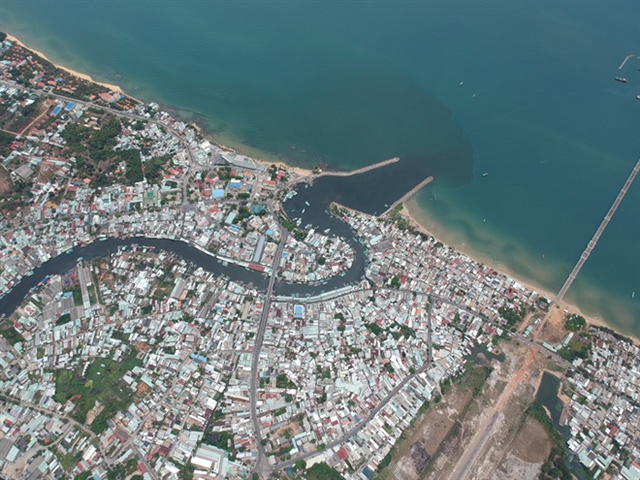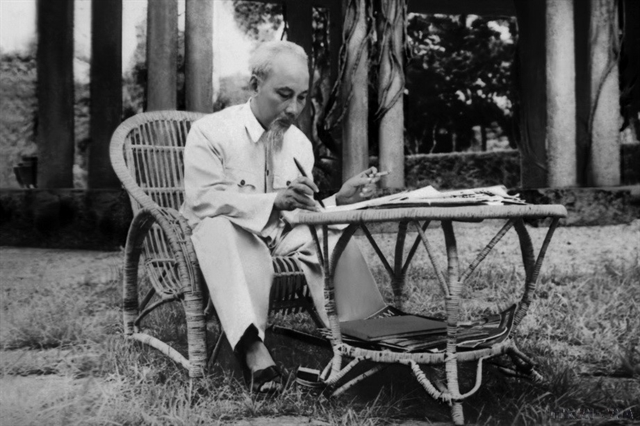 Environment
Environment


|
| A flycam image capturing the black water from Dương Đông River in southern Kiên Giang Province's Phú Quốc Island flowing into the sea, polluting the beaches nearby. Photo thanhnien.vn |
KIÊN GIANG — The Dương Đông River, the main water supply for Phú Quốc Island in southern Kiên Giang Province, has been reportedly suffered ecological death after being seriously polluted for years, according to Tuổi trẻ (Youth) newspaper.
The black smelly water has been flowing into the sea, polluting beaches nearby and scaring tourists away. Meanwhile, environmental authorities are still debating measures to clean up the river.
Dương Đông River is 21.6 kilometres long, stretching across Phú Quốc Island from Đá Bạc River to Dinh Cậu Estuary. Each day, hundreds of fishing vessels go in and out of Dương Đông Market, the largest seafood market in Dương Đông Town.
Garbage, wastewater and scum oil discharged from fishing vessels have turned the river water black and smelly.
“The river is dead. No fish or shrimp can live in such water”, Phù Thọ Bình, who has been living on the island for 45 years told the newspaper.
“It used to be a clean river with many fish”, he said.
Phú Quốc District’s Department of Natural Resources and Environment blamed the problem on 10 years of pollution by more than 10,000 households and 300 establishments, mostly fish sauce production businesses, along the river.
Most of the wastewater has been discharged directly into the river and polluted the water. The water becomes horrible in dry season when the amount of rain is low and fails to bring wastewater to the sea.
Last month, mass fish deaths occurred at the areas of Dương Tơ and Cửa Dương communes. The department worked with local police and took the water samples for tests. Three fish sauce production businesses, namely Khải Hoàn, Hồng Việt 1 and Thành Khoa, were found to have discharged untreated wastewater into the river, according to the department's test results.
At Khải Hoàn, the department’s inspectors found the business discharged 10 cubic metres of wastewater per hour while the wastewater treatment system could only handle 7 cubic metres per day.
Nguyễn Trọng Hán, head of Suối Đá Hamlet in Dương Tơ Commune, said fish deaths have happened since 2012, reducing the amount of fish living in the river considerably.
The residents used to catch fish for meals, but now there were hardly any fish, he said.
Two weeks ago, a flycam image capturing the black Dương Đông River stretching across Phú Quốc Island and flowing into the sea, blackening the surrounding beaches, stirred public concern.
Many commented that the pollution must be solved as soon as possible as it affected the lives of local people and tourism.
Polluted beaches would scare tourists away, they said.
Solutions needed
Phú Quốc District’s Department of Natural Resources and Environment suggested two solutions.
It said it was necessary to pump seawater into the river to help clean the black water along the river and dredge mud on the riverbed to clean up the whole river.
However, many experts said these measures could bring some risks such as salt intrusion along the river banks and negative impacts on the river’s ecological system.
Moreover, dredging could lead to erosion and affect thousands of houses along the river banks.
Phạm Văn Nghiệp, vice chairman of Phú Quốc District’s People’s Committee said the best solution was to move 300 enterprises into a separate zone equipped with wastewater treatment systems and to create land fund for households living along Dương Đông River, especially those in Dương Đông Town.
The solution could reach to several thousands of billions of đồng.
Nghiệp said the solution needed to be implemented step by step. The committee has submitted a project to collect wastewater from Dương Đông Town and send it to surrounding communes for treatment to the provincial People’s Committee.
If approved, the project would stop a large amount of untreated wastewater being released into the river. — VNS




